South America Newsletter November 2024
This month we bring you news from Peru, Colombia, Argentina, Venezuela, Chile, Brazil, Paraguay and Ecuador.
- Peru – Amnesty is bringing two Human Rights Defenders to the UK and you may book here to join them at the Human Rights Action Centre on 11 November evening and you can sign a petition.
- Colombia – Amnesty has issued a new Urgent Action demanding that the authorities investigate the attacks on Fundación Nydia Erika Bautista.
- Argentina – Joel Paredes is in this year’s Write For Rights campaign, you can sign an online petition
- Argentina – Amnesty has issued a new report Muted: The impact of digital violence against women journalists.
- Venezuela – Amnesty welcomes the two-year extension of the UN’s Fact-Finding Mission on Venezuela.
- Chile – On the 5th anniversary of the protests, Amnesty demands reparations for victims of the protests and reform of the Carabineros
- Brazil – As the trial of the killers of Marielle Franco begins, Amnesty demands that the master minds behind the killings be apprehended.
- Paraguay – Amnesty has issued an updated Urgent Action aimed at stopping the enactment of a bill that endangers work for human rights in Paraguay.
- Ecuador – Amnesty issued a briefing setting out its concerns about the decline in human rights protections under the current administration
PERU
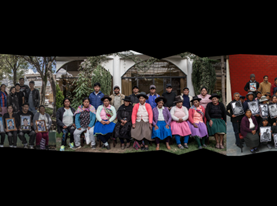
Peruvian community activists seeking justice
Two Peruvian Human Rights Defenders will visit the UK from 10-13 November to raise international pressure in the search for justice for those who were killed or seriously injured during the repression of protests in Peru in 2022-2023. Yovana Mendoza Huarancca, Vice-President of the Ayacucho Victims Association, and Mario Iquita Chambi, Representative of the Juliaca Victims Association, will be speak at an event that we are organising at the Human Rights Action Centre on 11 November from 6pm to 8pm. Space will be limited to a maximum attendance of 40. You can book here. Their programme includes a meeting at the Foreign, Commonwealth and Development Office and an event at Parliament. You can still sign our petition here.
The UN Committee on the Elimination of Discrimination against Women (CEDAW) has found that the policy of forced sterilisation in Peru, which took place during the 1990s, amounted to sex-based violence and intersectional discrimination, particularly against Indigenous, rural, and economically disadvantaged women. The decision was a response to a joint complaint filed by five victims who were forcibly sterilised between 1996 and 1997 as part of the State-led birth control policy.
COLOMBIA
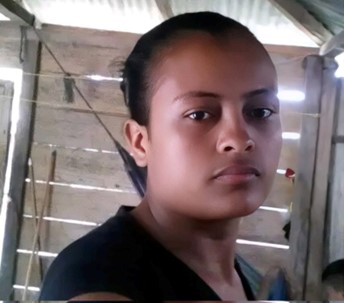
Nallely Sepúlveda of the Peace Community of San José de Apartadó, killed by former paramilitaries 19 March 2024
Amnesty International has published Yanette Bautista’s story of how she has been searching for her sister Nydia Erika Bautista who was forcibly disappeared in 1987. Three years later, Yanette found Nydia’s remains – she had been murdered by state authorities and her whereabouts concealed to her family. It was the first time she learnt about enforced disappearances, an issue that is rife in Colombia – even today – with an estimated 200,000 people disappeared between 1985 and 2016 according to the 2022 Final Report of Colombia’s Truth Commission.
Amnesty has issued a new Urgent Action on behalf of the Fundación Nydia Erika Bautista (FNEB), a women’s organization that promotes the rights of victims of enforced disappearance and fights impunity. On 24 October, with new information on the enforced disappearance of Nydia Erika Bautista, suspicious activity was recorded during an invitation-only gathering of FNEB and authorities and an email hacking attempt was made. We call on the Attorney General’s Office to investigate the threats and hacking and bring those responsible to justice. The correct contact email is derechoshumanos@fiscalia.gov.co
The Peace Community of San José de Apartadó reports that seven months since the killing of Nallely Sepúlveda and Edinson David, there has been no advance in investigating their murder. ‘Impunity continues.’ Over two hundred members of the Peace Community have been killed since its foundation in 1997. They are located in an area under the effective control of the Gaitanistas, also known as the Clan del Golfo, a former paramilitary grouping that is now the largest and richest criminal organization in Colombia.
Five hundred indigenous people in the Valle del Cauca Department fled their territory following an attack by an armed group on 17 October. This follows the death of two of the community’s children when they stepped on land mines planted by one of the armed group in the area last August. They are now sheltering in the municipality of Bolivar. The two main armed groups in the region are the Clan del Golfo and the ELN (National Liberation Army).
The NGO Justice for Colombia reports on the ceasefire and continued peace talks of the government with the EMC (a breakaway faction of the FARC guerrillas). Negotiations have been going well with two of the elements making up the EMC. ‘Crucially, the latest round of talks established a six-month ceasefire extension from 15 October 2024 to 15 April 2025’. Advances with the negotiating faction of the EMC bring some respite to Total Peace, after confrontation with the other faction escalated and talks with the ELN guerrillas have stalled for the past six months.
Colombia Reports estimates that cocaine exports from Colombia almost doubled in 2023 over 2022. This increases the funding of the armed groups waging war in the country. It also explains the drop in the international price of cocaine, which has in turn resulted in purer doses and more deaths of users unaccustomed to this higher dose. Countries where more deaths from cocaine use have increased include the UK, where deaths last year soared by 30%. See the BBC’s report Cocaine use fuels record high in drug deaths.
ARGENTINA
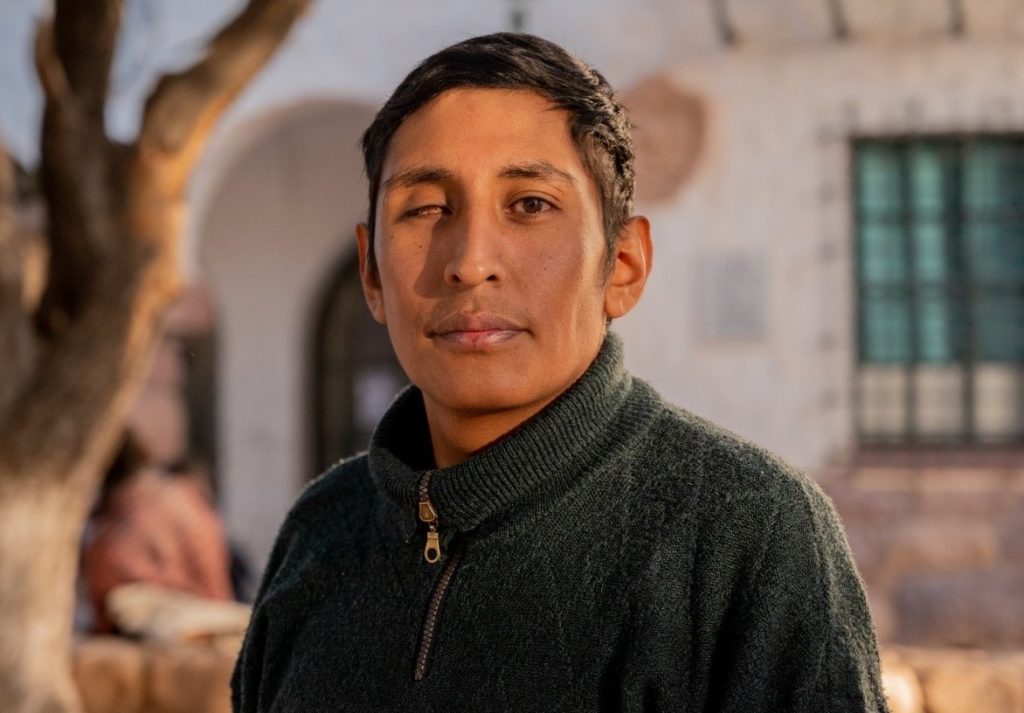
Joel Parades
Amnesty International has included Joel Paredes in this year’s Write For Rights campaign. Last year he joined a peaceful protest in Humahuaca, Jujuy. The demonstration was against constitutional reforms that threaten both freedom of assembly and the rights of Indigenous peoples. The police responded with unnecessary and excessive force, injuring many of the protesters. Joel was blinded by a rubber bullet. Take Action via this online petition. David has put more background details, a video featuring Joel, W4R campaigning and solidarity materials and guidance on his local group website.
There is some very good news. Following a conciliation hearing between activist Pierina Nochetti and the Municipality of Necochea, the criminal action against her has been ended. In addition, the administrative file against her has been closed and her employment status re-established. Pierina Nochetti, a lesbian activist and human rights defender, faced a criminal case for “aggravated damage” for her alleged participation in paining a mural that asks ‘Where is Tehuel?’. She faced up to 4 years in prison. Thanks to everyone who took action.
Amnesty International has published a report entitled “Muted: The impact of digital violence against women journalists”. The study reveals that 63.5% of female and gender-diverse journalists in Argentina have been victims of some type of digital violence in the last six years. Of these, 98.3% were subjected to isolated insults, while 85.6% were victims of harassment or trolling. 80% reported that their professional practice was somehow affected by acts of aggression on social media.
Amnesty International has sent an open letter to President Milei highlighting its serious concerns about the human rights situation in Argentina under his government. It expresses alarm that in 10 months of government, poverty has increased and public freedoms are under threat. The letter details the attack on freedom of expression and war against the rights of women. Whilst abortion is legal, despite attempts in Parliament to repeal it, the Government policies threaten the ability to purchase and distribute supplies that are essential for guaranteeing safe abortions in the country.
Diplomats from over 30 embassies in Argentina have signed a rare joint statement warning of “growing hostility, disinformation and phobia” against LGBTQIA+ people ahead of November’s Buenos Aires Pride. President Milei and senior officials in his government have made offensive comments about the LGBTQAI+ communityand closed the Ministry of Women, Genders and Diversity and state anti-discrimination watchdog INADI, among others. Argentina was the only member country that refused to sign a G20 gender equality and women’s empowerment statement.
VENEZUELA
Earlier this month, the UN Human Rights Council adopted a resolution renewing, for a period of two years, the mandate of the UN Fact-Finding Mission on Venezuela to monitor and report. This is in addition to the mandate of the Office of the High Commissioner for Human Rights. Amnesty International director Ana Piquer welcomed the renewal and noted the “unprecedented rise in politically motivated arbitrary detentions, including of children and people living with disabilities, unlawful killings, credible reports of torture, enforced disappearances, widespread attacks on civil society, and gross violations of fair trial guarantees”.
The Colombian authorities have repeated stating that they will not recognize the re-election of Venezuelan President Nicolas Maduro if the government does not release records from this year’s disputed term before January 10th. Reports suggest that a crackdown on protests in Venezuela has left at least 27 people dead, roughly 200 injured, and around 2,400 arrested.
Maduro has recalled the Venezuelan ambassador to Brazil due to Brazil’s reluctance to accept Venezuela’s electoral results. The Brazilians have also moved to block Venezuela from joining the BRICS country grouping. Whilst the Brazilian leader Lula has refrained from accusing Maduro of rigging the election, his administration has urged Venezuelan electoral officials to release detailed vote count logs verifying the result. Lula has suggested the possibility of Venezuela holding new elections.
The European Parliament has awarded Venezuelan opposition leaders Maria Corina Machado and Edmundo Gonzalez the 2024 Sakharov Prize for Freedom of Thought. Both have now left the country.
CHILE
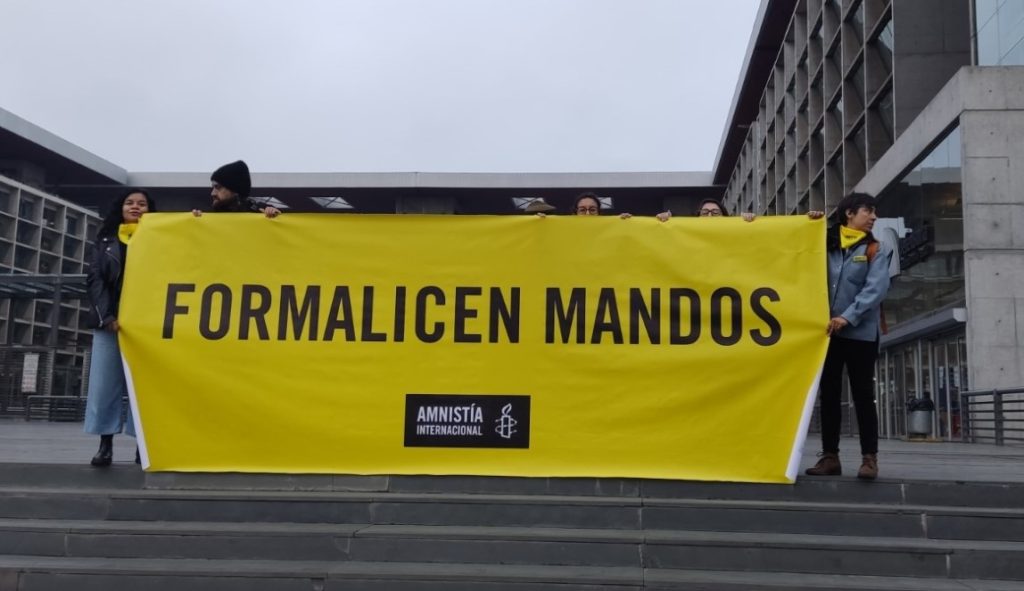
Amnesty International were outside the court for the hearing
A formal hearing launched a criminal investigation against three people who served as senior Carabineros commanders during the political repression of protests in 2019 – including the recent Director General of Carabineros, Ricardo Yáñez. The North Central Metropolitan Prosecutor’s Office announced that it is investigating them for their possible participation as perpetrators of the omissive crime of unlawful coercion, resulting in serious injuries and homicide, initiating legal proceedings. Two people died at the hands of the police and thousands suffered serious injuries, including irreversible eye damage.
On the 5th anniversary of the protests Amnesty International said victims and their families continue to wait for justice and full reparation whilst impunity continues to prevail in the country. Of a total of 10,142 complaints of police and armed forces brutality during this period, less than 1% have obtained justice. The remaining 99% are still pending and many of them may not be investigated – some could expire after five years. Amnesty International has consistently maintained that reform of the Carabineros is essential, but highlighted that “structural reform of the Carabineros has been practically forgotten.”
Undersecretary of Foreign Affairs, Gloria de la Fuente , has announced Chile’s candidacy for re-election to the UN Human Rights Council for the 2026-2028 term. She said “Being a member of the Human Rights Council is a great responsibility, as it provides Member States with the opportunity to play a decisive role in the discussion and establishment of initiatives for the promotion and protection of human rights around the world.” Chile has been a member of the Human Rights Council on four previous occasions: 2009-2011, 2012-2014, 2018-2020, and 2023-2025.
The UN Committee on the Elimination of Discrimination against Women issued critical findings against Chile. The Committee voiced deep concern about widespread gender-based violence against women in Chile, including sexual violence and high rates of femicide. It also highlighted the rise of online abuse through cyberstalking, harassment, and non-consensual sharing of intimate images. The Committee urged Chile to raise public awareness about the criminal nature of all forms of gender-based violence against women and ensure better protection for survivors.
BRAZIL
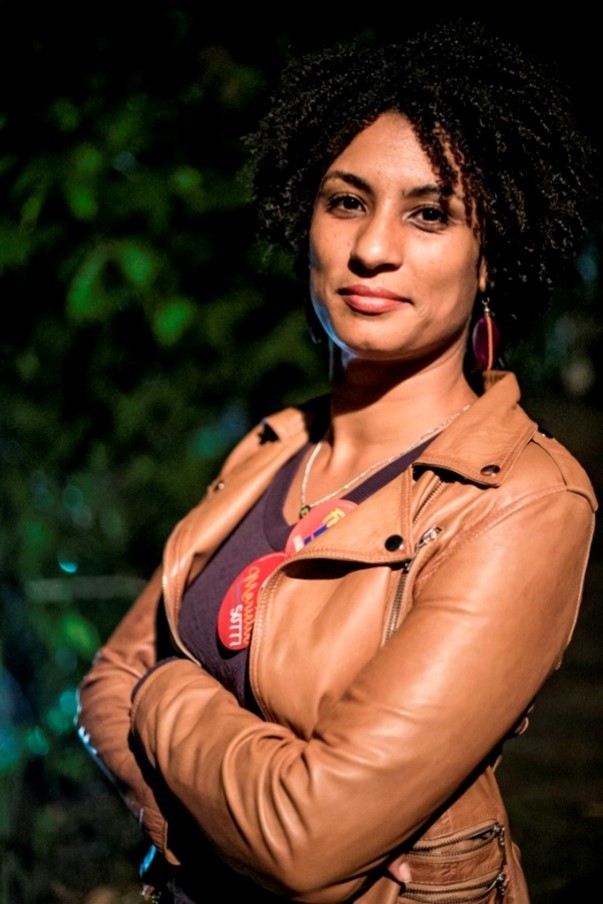
Marielle Franco (1979-2018)
Amnesty International has issued a press release on the possible reasons why after six years of the murder of council woman Marielle Franco and her driver, Anderson Gomes, the former military police officers and confessed murderers will be tried by a popular jury on October 30. ‘However, true justice will only be achieved when the Brazilian authorities ensure that all those responsible for the crime, including its masterminds, as well as all those responsible for any deviations and obstructions of the investigations, are also brought to justice.’
The BBC reports on the $30 billion settlement that mining giants BHP and Vale have agreed to in compensation for the Mariana dam collapse in 2015 that caused the country’s worst environmental disaster. It killed 19 people, left hundreds others homeless, and poisoned the river. The dam was owned by Samarco, a joint venture between Vale and BHP. However, many people in the community were still arguing they had not received justice or enough to rebuild their lives nine years on. Many have launched in London a civil case against BHP, where the company was once listed on the LSE.
Amazon Watch on Good news! Last week, Brazil’s Munduruku people celebrated a hard-fought and emblematic victory upholding embattled Indigenous land rights. Brazilian Justice Minister issued a long-awaited order moving the Munduruku territory of Sawré Muybu in Pará state towards definitive demarcation. ‘The demarcation of Indigenous territories is a critical long-term solution to both the fires in the Amazon and the climate crisis. Indigenous lands in the Amazon are the best-protected areas, with communities on the front lines defending them against numerous threats, including roads, mining, and industrial agriculture.’
PARAGUAY
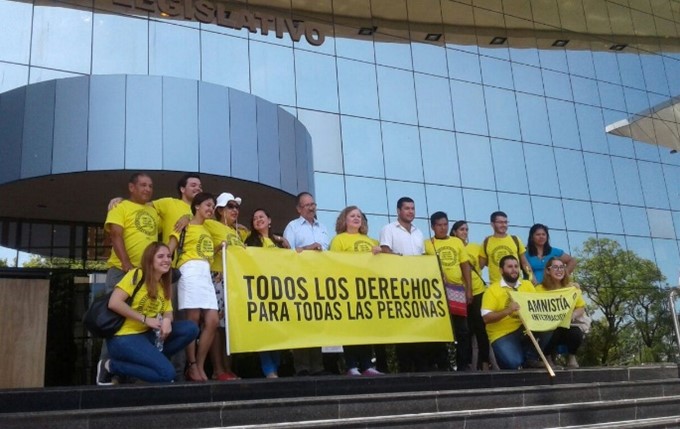
Amnesty activists outside the Paraguayan Congress
Amnesty has issued an updated Urgent Action aimed at stopping the enactment of a bill that endangers work for human rights in Paraguay by seeking to constrain the activities of civil society organisations. The first update sought, unsuccessfully, to stop the bill being passed by parliament. This latest update calls on the President to veto the bill.
ECUADOR
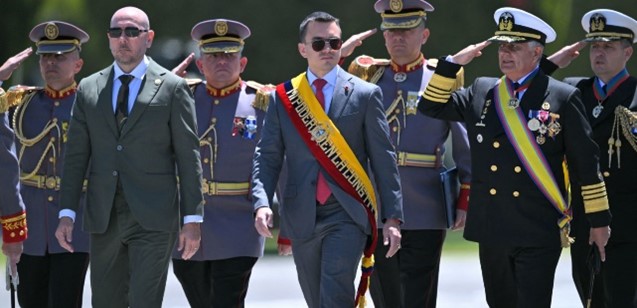
President Noboa and military officers
On the eve of President Daniel Noboa’s first year in office and ahead of the UN Human Rights Committee’s review of Ecuador in Geneva, Amnesty issued a briefing setting out its concerns about the decline in human rights protections under the current administration. In the face of rising violence, the President has opted for a hardline approach to security policies, labelling drug-trafficking organizations as “terrorists”, declaring an “internal armed conflict” and continuously renewing states of emergency, as part of the so-called “Plan Fenix.”
All the best,
South America Team – Richard Crosfield (Colombia and Brazil), David Rogers (Argentina and Chile), James Baird (Venezuela) and Graham Minter (rest of South America). And please don’t forget that you can follow us on our Facebook page and X Twitter.
